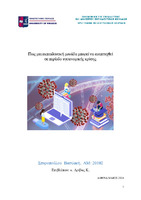Πως μια εκπαιδευτική μονάδα μπορεί να αναπτυχθεί σε περίοδο υγειονομικής κρίσης

Προβολή/
Λέξεις κλειδιά
Διαχείριση κρίσεων ; Εκπαιδευτική ηγεσία ; Κρίση υγείας ; Πανδημία ; COVID-19 ; Εξ αποστάσεως εκπαίδευσηΠερίληψη
Η ανάπτυξη των εκπαιδευτικών μονάδων κατά τη διάρκεια κρίσεων υγείας, όπως η πανδημία Covid-19, απαιτεί προσαρμοστική και ανθεκτική ηγεσία. Η διαχείριση κρίσεων σε εκπαιδευτικές μονάδες προϋποθέτει την κατανόηση της σύνθετης φύσης των κρίσεων και την εφαρμογή κατάλληλων μοντέλων για την αντιμετώπιση πρωτοφανών προκλήσεων. Οι ηγέτες των σχολείων πρέπει να υιοθετήσουν μια προληπτική στάση, η οποία χαρακτηρίζεται από σαφή επικοινωνία, στρατηγικό σχεδιασμό και ευελιξία, ώστε να διασφαλιστεί η συνέχιση της εκπαίδευσης και η ευημερία όλων των ενδιαφερομένων.
Στις κρίσεις υγείας, ο ρόλος του διευθυντή του σχολείου καθίσταται κρίσιμος. Οι αποτελεσματικοί διευθυντές επιδεικνύουν ιδιότητες όπως η αποφασιστικότητα, η ενσυναίσθηση και η καινοτομία, οι οποίες είναι απαραίτητες για τη διαχείριση της πολυπλοκότητας μιας κρίσης. Πρέπει να χρησιμοποιούν μοντέλα διαχείρισης κρίσεων για την αντιμετώπιση άμεσων ζητημάτων, ενώ παράλληλα σχεδιάζουν τη μακροπρόθεσμη βιωσιμότητα. Αυτό περιλαμβάνει τη διασφάλιση της ασφάλειας των μαθητών και του προσωπικού, τη διατήρηση των ακαδημαϊκών προτύπων μέσω της εξ αποστάσεως εκπαίδευσης και την παροχή συναισθηματικής υποστήριξης στη σχολική κοινότητα.
Η εξ αποστάσεως μάθηση καθίσταται βασικό στοιχείο για τη διατήρηση της εκπαιδευτικής συνέχειας. Οι ηγέτες των σχολείων πρέπει να χρησιμοποιούν την τεχνολογία για να επιτρέπουν την εξ αποστάσεως εκπαίδευση, εξασφαλίζοντας ότι όλοι οι μαθητές έχουν πρόσβαση στους απαραίτητους μαθησιακούς πόρους. Αυτή η μετάβαση απαιτεί μια σταθερή υποδομή, επαγγελματική ανάπτυξη για τους εκπαιδευτικούς και τακτική συνεργασία με τους μαθητές και τους γονείς, ώστε να ξεπεραστούν οι προκλήσεις της αποτελεσματικής διαδικτυακής εκπαίδευσης.
Επιπλέον, η ηγεσία επηρεάζει σημαντικά τις εκπαιδευτικές μονάδες κατά τη διάρκεια μιας κρίσης υγείας. Οι διευθυντές που προωθούν ένα περιβάλλον συνεργασίας και διατηρούν διαφανή επικοινωνία με τους εκπαιδευτικούς, τους μαθητές και τους γονείς μπορούν να μετριάσουν τις αρνητικές επιπτώσεις της κρίσης. Είναι ζωτικής σημασίας για τη διατήρηση του ηθικού, την αντιμετώπιση των ανησυχιών και την προσαρμογή των πολιτικών στην εξελισσόμενη κατάσταση. Υιοθετώντας καινοτόμες λύσεις, διατηρώντας ανοιχτή επικοινωνία και δίνοντας προτεραιότητα στην ευημερία των κοινοτήτων τους, οι διευθυντές των σχολείων μπορούν να αντιμετωπίσουν τις κρίσεις υγείας και να διασφαλίσουν τη συνεχή ανάπτυξη και εξέλιξη των εκπαιδευτικών τους μονάδων.
Τα αποτελέσματα της έρευνας δείχνουν μια ισορροπημένη κατανομή των φύλων και ποικίλες ηλικίες και επαγγελματική εμπειρία μεταξύ των συμμετεχόντων, αναδεικνύοντας μια ποικιλία προοπτικών. Υπάρχει σημαντική διάσταση απόψεων σχετικά με την αναγκαιότητα και την αποτελεσματικότητα των μοντέλων διαχείρισης κρίσεων, της προληπτικής διαχείρισης και της καινοτόμου ηγεσίας σε εκπαιδευτικά περιβάλλοντα. Οι ανάμεικτες απόψεις σχετικά με την εξ αποστάσεως εκπαίδευση και τον ρόλο της τεχνολογίας υπογραμμίζουν περαιτέρω την ανάγκη για βελτιωμένη επικοινωνία, κατάρτιση και υποστήριξη.

